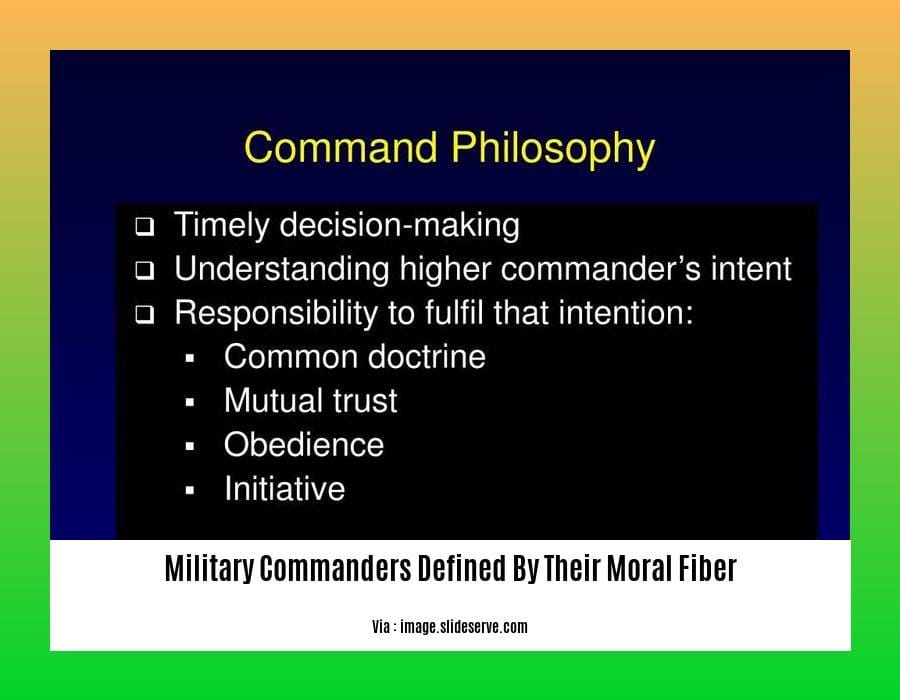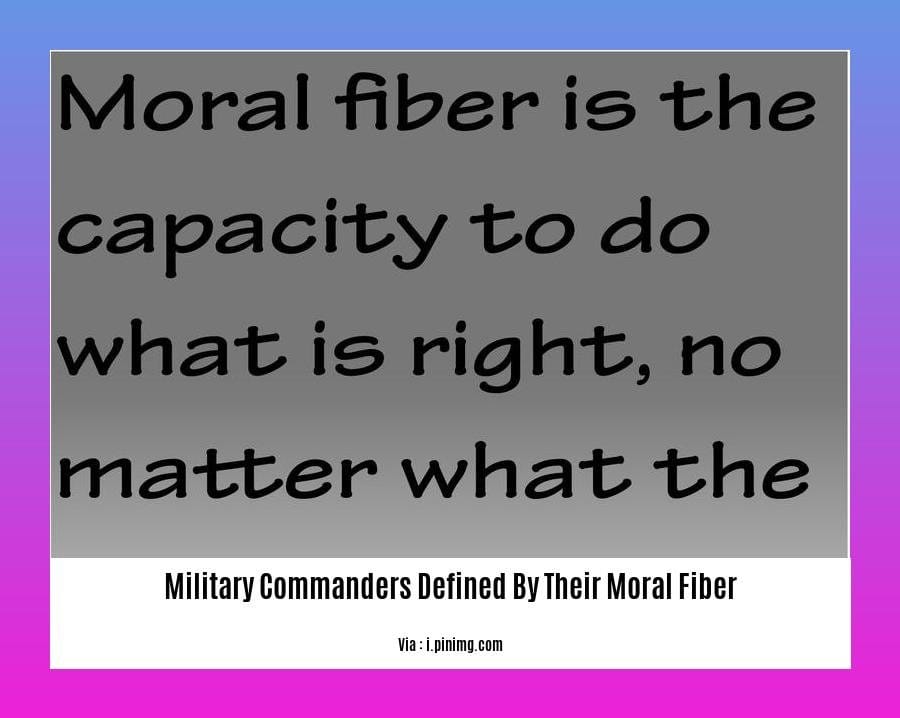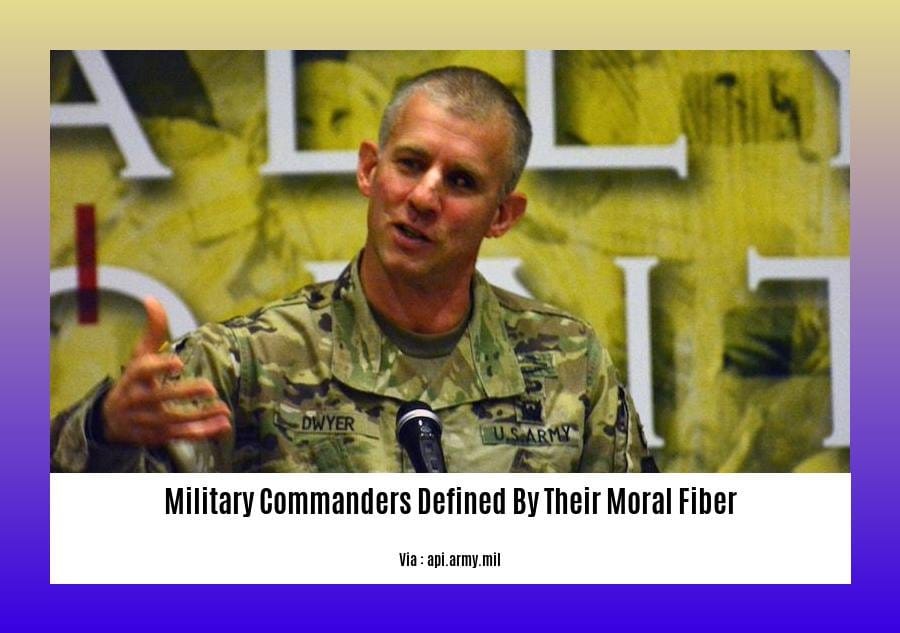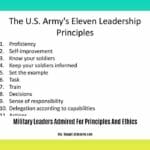In “The Moral Imperative: Military Commanders Defined by Their Moral Fiber,” we explore the profound impact of moral character on military leadership. Commanders who prioritize integrity, compassion, and selflessness inspire their troops, rally nations, and leave an enduring legacy of honor.
Key Takeaways:

- High troop morale significantly boosts military effectiveness.
- Morale encompasses confidence, enthusiasm, and determination.
- Key factors affecting troop morale are:
- Commander’s competence
- Army’s ethical values
- National sentiment
- Attentive commanders prioritize troops’ well-being to maintain high morale.
- Morale is a crucial mindset that either motivates or hinders military action.
Military Commanders Defined by Their Moral Fiber
Throughout history, military commanders who have been defined by their moral fiber have inspired their troops, rallied nations, and left an enduring legacy of honor and courage. These commanders understand that troop morale is a key element of military capability and that morale encompasses self-assurance, passion, and willpower.
Factors that influence troop morale include the commander’s abilities, the military virtue of the army, and national feeling. Commanders who are attentive to morale ensure adequate physical well-being, recognize the importance of esprit de corps, and foster a sense of purpose and belonging among their troops.
Moral fiber is not simply about following rules and regulations. It is about leading by example, making ethical decisions, and putting the needs of others before your own. Military commanders defined by their moral fiber are role models for their troops. They are the ones who inspire trust and confidence, and who motivate their troops to achieve great things.
Here are some examples of military commanders who have been defined by their moral fiber:
- George Washington: Washington was a brilliant military strategist and a man of great character. He led the Continental Army to victory in the Revolutionary War, and he is considered one of the greatest military commanders in history. Washington’s moral fiber was evident in his courage, his integrity, and his unwavering commitment to the cause of American independence.
- Abraham Lincoln: Lincoln was the president of the United States during the Civil War. He was a compassionate and determined leader who guided the nation through one of its darkest hours. Lincoln’s moral fiber was evident in his empathy for others, his willingness to compromise, and his unwavering belief in the Union.
- Martin Luther King, Jr.: King was a civil rights leader who fought for equality and justice for all Americans. He was a powerful speaker and a tireless advocate for nonviolent resistance. King’s moral fiber was evident in his courage, his compassion, and his unwavering belief in the power of love.
These are just a few examples of military commanders who have been defined by their moral fiber. These commanders have inspired their troops, rallied nations, and left an enduring legacy of honor and courage. They are role models for us all, and they remind us that moral fiber is essential for leadership in any field.
Throughout military history, numerous military leaders have been admired for their unwavering principles and ethics. These morally upright military commanders have led with distinction, earning the respect of their peers and superiors. Their exemplary character has served as a beacon of integrity and honor, inspiring others to strive for similar ideals. Among these esteemed leaders are those commanders respected for high character, who have displayed an unwavering commitment to ethical behavior and moral decision-making.
Lack Of Moral Fibre
During World War II, the Royal Air Force (RAF) used the derogatory term Lack Of Moral Fibre (LMF) to stigmatize aircrew who refused to fly operations. This punitive measure was implemented to address the increasing number of psychological casualties within Bomber and Coastal Commands.
Identification and Consequences:
Squadron commanders were tasked with identifying aircrew who had lost their confidence. Those labeled with LMF faced severe consequences, including:
- Removal from their crews
- Transfer to non-operational roles
- Public shaming and ridicule
Medical Considerations:
Initially, LMF was applied indiscriminately to aircrew, regardless of whether their reluctance to fly stemmed from genuine psychological issues or moral weakness. Medical officers later argued for distinguishing between these two groups to ensure that those with legitimate medical conditions received appropriate support.
Ethical Concerns:
The use of LMF raised ethical concerns, primarily due to its lack of due process and reliance on subjective judgments. The stigmatization of psychological casualties also raised questions about the treatment of mental health issues within the military and its impact on morale.
Key Takeaways:
- LMF was a punitive term used by the RAF to stigmatize aircrew who refused to fly operations.
- LMF was based on subjective judgments and lacked due process, raising ethical concerns.
- LMF failed to distinguish between genuine psychological issues and moral weakness, resulting in inadequate support for those with mental health conditions.
- LMF negatively impacted morale and undermined the well-being of aircrew, highlighting the importance of ethical leadership in military contexts.
Citation:
- Wikipedia:
Why Soldiers Do Not Feel Pain During War Physiology
The battlefield is a crucible that tests the limits of human endurance. The pain inflicted by combat can be unimaginable, yet soldiers often display remarkable resilience, enduring wounds and hardships that would cripple civilians.
Emotions play a crucial role in this phenomenon. In the heat of battle, the release of adrenaline and other hormones can block pain signals, creating a state of euphoria or dissociation that allows soldiers to fight through injuries.
While the physiological response to pain can be altered during combat, it’s important to note that soldiers are not immune to pain. In fact, chronic pain is a significant issue among military personnel, with approximately 44% reporting persistent pain lasting at least three months.
Key Takeaways:
- Excitement, elation, and ideological zeal can diminish or eliminate pain.
- Chronic pain is common among active military personnel.
- Mental disorders can exacerbate pain severity.
- Military pain management strategies prioritize patient education, increased pain assessments, and monitored opioid use.
Most Relevant URL Source:

FAQ
Q1: What is moral fiber?
A1: Moral fiber is a term used to describe the ethical and moral strength of a person or group. It refers to the ability to make ethical decisions, even in difficult or dangerous situations.
Q2: What is moral jeopardy?
A2: Moral jeopardy refers to a situation where a person’s ethical or moral values are challenged or threatened. In the military, moral jeopardy can occur when soldiers are faced with situations that require them to make difficult ethical decisions.
Q3: What does lack of moral fiber mean?
A3: Lack of moral fiber refers to a deficiency in a person’s ethical or moral strength. It can lead to a lack of courage, integrity, or honesty, and can have negative consequences for the individual and those around them.
Q4: Why do soldiers not feel pain during war?
A4: While it is not always true that soldiers do not feel pain during war, extreme emotions, such as excitement, enthusiasm, and ideological zeal, can diminish or eliminate pain, and may provide soldiers with the mental fortitude to endure hardship.
Q5: What are the physiological effects of pain during combat?
A5: The physiological effects of pain during combat can include increased heart rate, blood pressure, and respiration, as well as muscle tension, sweating, and nausea. These effects can have a negative impact on a soldier’s ability to perform their duties and may lead to injury or death.
- China II Review: Delicious Food & Speedy Service - April 17, 2025
- Understand Virginia’s Flag: History & Debate - April 17, 2025
- Explore Long Island’s Map: Unique Regions & Insights - April 17, 2025
















